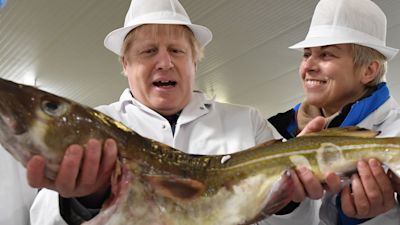UK 'hopeful' of resolving fishing dispute with France as fresh talks start in Paris

The UK is "hopeful" it can resolve its fishing dispute with France after threats issued by both sides brought tensions to boiling point.
Brexit negotiator David Frost is in Paris for talks with France's Europe minister Clement Beaune in Paris in an attempt to end the crisis in cross-Channel relations, which so far has seen the French seize a trawler and charge its skipper for fishing in their waters without a licence.
France released the boat on Wednesday afternoon and it arrived back in the UK on Thursday morning, paving the way for a resolution over the fishing rights on French and British vessels.
Lord Frost told ITV News he is "always hopeful of making progress" in talks with France, but dampening expectations as he ahead of negotiations, he added "we'll see where we get to".
Following the meeting, the government released a statement which said "they discussed the range of difficulties arising from the application of the agreements between the UK and the EU. Both sides set out their positions and concerns.
What is the fishing dispute between Britain and France?
The French have threatened to block British boats from docking at their ports and stop imports of some UK products over what it perceives as a refusal to issue licences to its trawlers to operate in UK waters.
The UK government says the overwhelming majority of applications for licences have been granted, but Lord Frost insisted no additional licences had been issued ahead of the talks.
French president Emmanuel Macron has delayed the imposition of punitive measures while talks between the UK, France and the European Commission take place.
But the French government has insisted the measures - which could include a ban on British trawlers landing their catches in French ports and tighter customs checks to hamper cross-Channel trade - remain "on the table" if a deal cannot be reached.
Lord Frost will follow his talks with Mr Beaune on Thursday by heading to Brussels on Friday to meet European Commission vice-president Maros Sefcovic.
Government spokesman Gabriel Attal underlined the threat of sanctions remained: "We will see what comes with those meetings.
"As you know, the control measures that we announced are still suspended but all options are on the table and we may need to implement those measures if we do not reach an agreement."
On Wednesday, he said: "We are just waiting for one thing: for the UK to respect the deal that they signed."
Under the Brexit deal, European Union boats which can show they have fished in British waters in at least four of the years from 2012 to 2016 are eligible for a licence.
Some 1,831 applications for licences have been received, with 1,793 issued.
The main source of contention has been for smaller vessels, the under 12-metre category fishing between six and 12 nautical miles of the coast, where 50 applications have been received - all from French vessels - but just 19 have been issued.
Is there any chance of a further Brexit breakthrough in Paris?
Despite the Brexit minister's optimistic tone on fishing talks, it is difficult to see how the two sides can find common ground on other issues, given both sides have hardline stances on the red lines they've drawn around the Northern Ireland protocol.
The protocol is an arrangement in the Brexit divorce deal signed in 2019 that ensures there is no hard Irish border by keeping Northern Ireland inside the EU's single market - under the agreement any trade disputes must be resolved by the European Court of Justice (ECJ).
The UK is demanding that the ECJ is removed from the process entirely and replaced with an independent arbitrator - Boris Johnson believes the public wanted sovereignty when it voted to leave the EU and that wish cannot be realised if Britain is subject to the rulings of a foreign court.
But the EU is insisting the ECJ must continue to play a role as the ultimate authority over disputes involving the single market and comments from European Commission Executive Vice-President Frans Timmermans suggest the bloc will not budge.
He told ITV News Political Editor Robert Peston: “I think Mr Frost knows very well that this is not possible for the European Union.
“I know he knows full well that whenever the internal market is involved, the ultimate arbitrator is the European Court of Justice.
“This is, I think, extremely well-known in London and instead of talking about red lines, I think it would be more productive to talk about the ideas the European Union came up with.”
Asked about the risks of the UK triggering Article 16, Mr Timmermans added: “Let’s hope this doesn’t happen, let’s hope we can find a way out”.